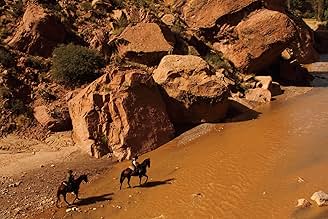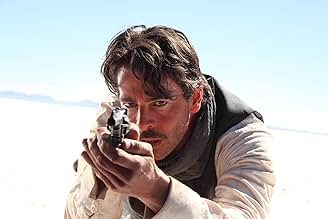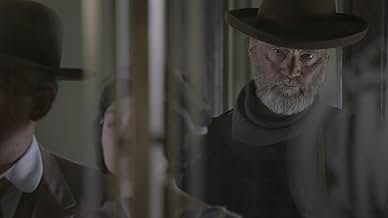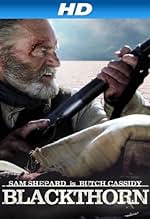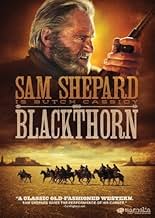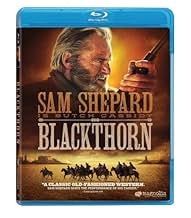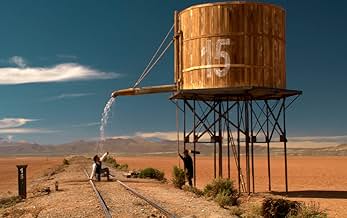En Bolivia, Butch Cassidy suspira por una última visita de su hogar, una aventura que lo alinea con un joven ladrón y convierte al dúo en un objetivo tanto para las pandillas como para los a... Leer todoEn Bolivia, Butch Cassidy suspira por una última visita de su hogar, una aventura que lo alinea con un joven ladrón y convierte al dúo en un objetivo tanto para las pandillas como para los agentes de la ley.En Bolivia, Butch Cassidy suspira por una última visita de su hogar, una aventura que lo alinea con un joven ladrón y convierte al dúo en un objetivo tanto para las pandillas como para los agentes de la ley.
- Dirección
- Guionista
- Elenco
- Premios
- 6 premios ganados y 15 nominaciones en total
- Dirección
- Guionista
- Todo el elenco y el equipo
- Producción, taquilla y más en IMDbPro
Opiniones destacadas
It was believed that Butch Cassidy and The Sundance Kid both perished at the hands of the Bolivian army in 1908. Not so, for here is Butch Cassidy 20 years after the supposed event, alive and well and living in a secluded Bolivian village under the name James Blackthorn.
What a lovely idea, that of one of history's most famous outlaws actually living longer than history led us to believe. OK, it's a scratchy premise but it allows for a quite elegiac film as we follow an older and grizzled Cassidy on another adventure. That adventure sees him team up with mischievous Spaniard Eduardo Apodaca, the latter of which tries to rob Blackthorn/Cassidy and then offers to repay the old outlaw with the proceeds from some hidden loot stashed away from a robbery. They set off and sure enough there is a posse on their tail, meaning the pair have to stay one step ahead of their pursuers, something which puts the twinkle back in Cassidy's eyes. But not all is as it seems and with flash backs showing Butch and Sundance in their prime (Waldau as the young Cassidy is an inspired choice as per likeness to Shepard), aided by the feisty Etta Place, this is a fully rounded tale.
The film quite simply is unhurried and respectful to the art of story telling and is rich with a lead characterisation of considerable substance (Shepard is wonderful, really gets to the soul of the character). Oh it is punctured by the odd action scene, even some humour is in the mix, there's even time for machismo and romantic threads of worth, but this beats a melancholy heart and is All the better for it. It also happens to be one of the most gorgeously photographed Westerns of the modern era. Filmed primarily on location in Bolivia, the landscapes - be it the mountainous ranges or pin sharp salt flats - are sublime, God's wonderful Earth in all its glory expertly realised by Anchia, marking this out as an absolute Blu-ray essential for Western fans big into location photography. While Godoy's musical score is pitch perfect for the tonal flows in the narrative.
There's the odd cliché, Rea is a touch wasted and some may decry the simplicity of plot, but this is thoughtful and awash with the love of the Western genre. If only for Shepard and the photography then this is worth it for Western fans, as it is it also calls out to those who like some emotional reflection in their Oaters. 8/10
Anyway I enjoyed this film, not a Oscar winner, but well worth it, solid acting by all actors, I gave it a 7.5 out of 10
In all the expanse of the Bolivian landscape the humanity and characterizations are not lost and we care about Butch Cassidy, his lady love, and even the ex-Pinkerton who discovers, then assists our anti-hero on his way to settle the score.
All the elements of classic Westerns are at work here and the pace is methodical and maintained for a rhythmic ride. The gun-play is realistic and never stylized and the result is a new Western with an old West feel.
THE PLOT: Almost 20 years after Butch Cassidy was supposedly shot-down in Bolivia he is shown alive and well, living in a ranch house in the mountains under the name James Blackthorn. He has a "nephew" (or, more likely, a son) in the USA and decides to take his stolen loot, retire there, and live happily ever after. Unfortunately for him, a young outlaw (Eduardo Noriega) puts the kibosh on his plans, but they eventually team-up, perhaps because the dude reminds him of his younger days or of his deceased best friend, the Sundance Kid.
Another reviewer pointed out that Butch Cassidy is essentially regarded as a real-life Western Robin Hood. Yes, he was an outlaw, but he stole from the rich (the banks, trains and such) and gave to well, himself. Okay, so he wasn't exactly Robin Hood, but people give him a pass because he fought the system and won, at least until his reported death at the age of 42 in 1908. But there are theories and support for the idea that he didn't die and this movie explores this possibility.
The reason I bring up the whole Robin Hood ethic -- i.e. steal from the rich, etc. -- is that the movie illustrates that, outlaw though he may have been, even Butch Cassidy had an intrinsic moral code that he followed. Those who broke that code were not worthy of his time, respect or compassion. Period.
Another reviewer seemed to read too much into this element and interpreted the movie as a Socialist vehicle with didactic politics: The idea that being singularly rich is intrinsically evil and therefore those less fortunate are morally justified in demanding (i.e. stealing) their wealth. But I don't think the filmmakers necessarily support this view any more than the makers of the original movie did in 1969. It's basically just Butch's personal justification for his lifestyle. He's a thug who unsurprisingly made excuses for his foolish way of life and he keeps payin' the price: Everyone around him dies prematurely, he's left alone & weary, and his stolen loot seems to keep falling through his fingers, one way or another. Yeah, Karma's a real biyatch.
When my wife or I watch Westerns we always ask each other: "Was it as good as Dances With Wolves"? The inevitable answer is always, "No, but " Of course, few Westerns are as good as "Dances With Wolves"; it's the "but" that will determine if the movie is worth seeing. In the case of "Blackthorn," this is definitely watchable for a number of reasons, including the intriguing ideas noted above. It's just a solid modern Western with many of the requisite staples that mark the genre, such as excellent landscape cinematography (in this case Bolivia, shot on location), a quality modern Western score, shoot-outs, brooding outlaws, saloons, booze, posses, mines, escapes, beautiful women, Pinkertons, Natives, cowboys, horses and locomotives. Speaking of posses, the posse-pursuit in this film is at least twice as long as the elongated posse sequence in the original movie, and probably longer.
"Blackthorn" borrows from Westerns like "Butch Cassidy and the Sundance Kid" (naturally), "The Shootist" (1976), "Unforgiven" (1992) and the more modern "Seraphim Falls" (2006). The association with the first film is obvious. It's reminiscent of "The Shootist" and "Unforgiven" in that the story involves an aged and meditative outlaw who doesn't have much further to go. It brings to mind "Seraphim Falls" (and Jack Nicholson's "The Shooting" from 1966) with its long, surreal chase scenes in the desert. The modern gloss also brings to mind "Seraphim." Lastly, the basic tone is akin to "The Long Riders" (1980). What makes "Blackthorn" unique is its setting in Bolivia; and, to a lesser degree, the time period, 1927.
FINAL SAY: I suppose you could say that this is a character study and Sam Shepherd is excellent as Butch Cassidy. Like "Unforgiven," it's a brooding, elegiac Western focusing on less-than-respectable characters with flashes of Western-styled violence. It also has something interesting to say, although it's nothing enlightening or deep.
The film runs 98 minutes.
GRADE: B+
¿Sabías que…?
- TriviaThe coca leaf, which is and has been widely used for medicinal and restorative purposes in Bolivia and surrounding regions, and is featured in at least one scene in the film, is commonly said to resemble the leaves of a blackthorn bush.
- ErroresAt the very beginning of the film there is text reading "Butch Cassidy was ONE THE MOST wanted outlaws in America..." The OF that should be included in the sentence is curiously missing.
- Citas
James Blackthorn aka Butch Cassidy: Sometimes I think there's only two moments in a man's life: the one is when he leaves home, and the other one is when he returns. Everything else is just in the middle.
- Bandas sonorasAin't No Grave
Popular
Arranged by David Gwyn (as David Gwynn)
Guitar by David Gwyn (as David Gwynn)
Performed by Sam Shepard
Selecciones populares
- How long is Blackthorn?Con tecnología de Alexa
Detalles
- Fecha de lanzamiento
- Países de origen
- Sitios oficiales
- Idiomas
- También se conoce como
- Tay Súng Viễn Tây
- Locaciones de filmación
- Productoras
- Ver más créditos de la compañía en IMDbPro
Taquilla
- Total en EE. UU. y Canadá
- USD 200,558
- Fin de semana de estreno en EE. UU. y Canadá
- USD 15,254
- 9 oct 2011
- Total a nivel mundial
- USD 987,883
- Tiempo de ejecución1 hora 42 minutos
- Color
- Mezcla de sonido
- Relación de aspecto
- 2.35 : 1
Contribuir a esta página



